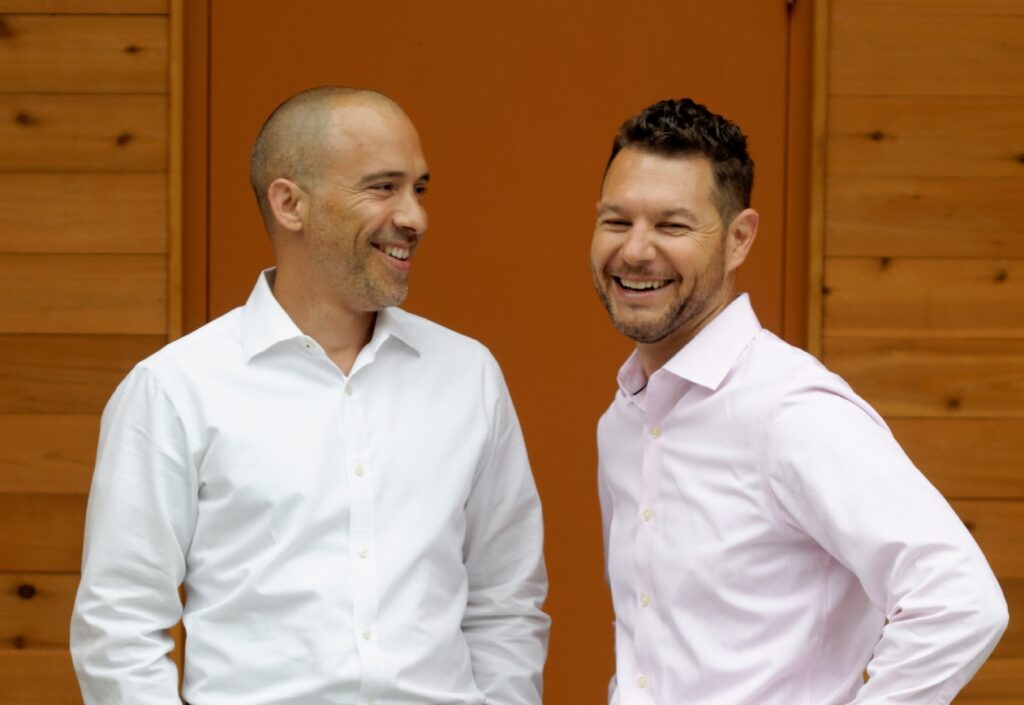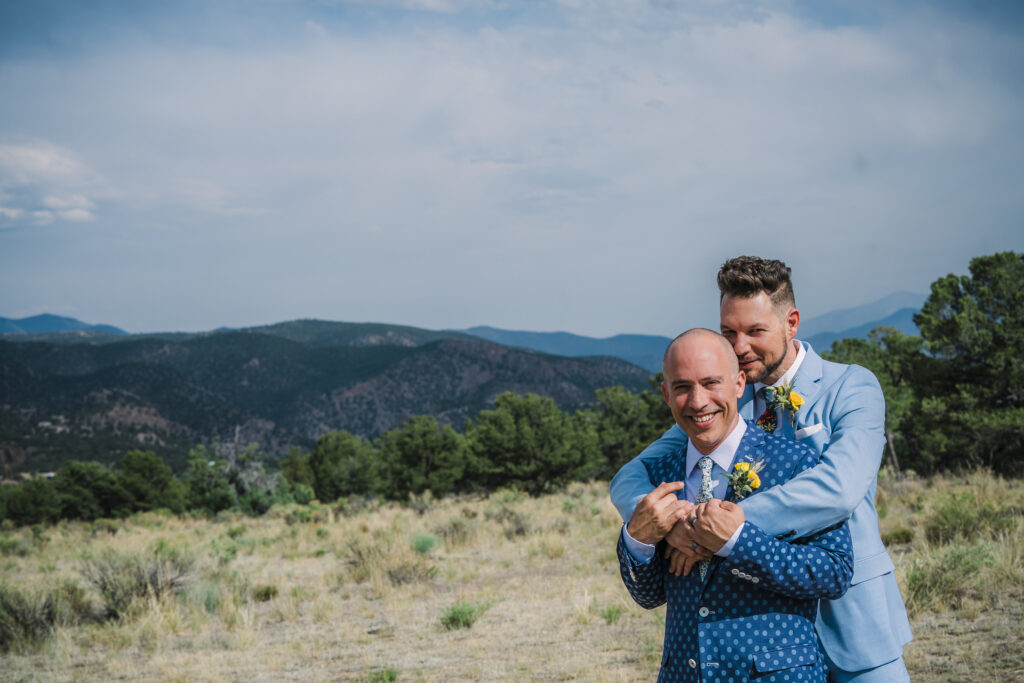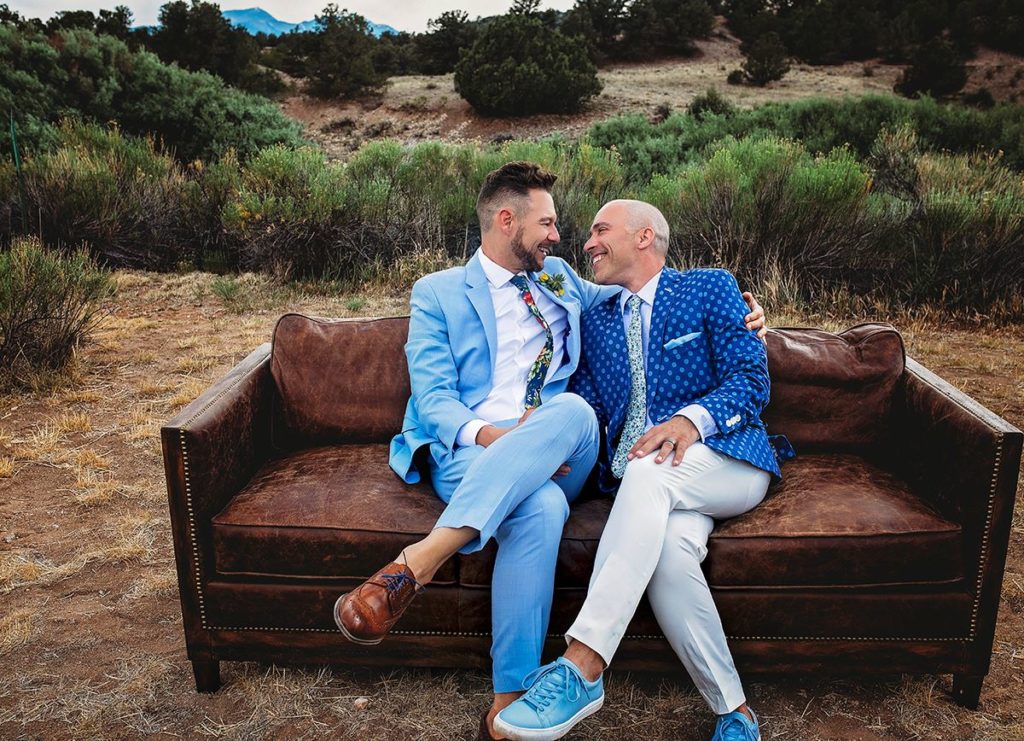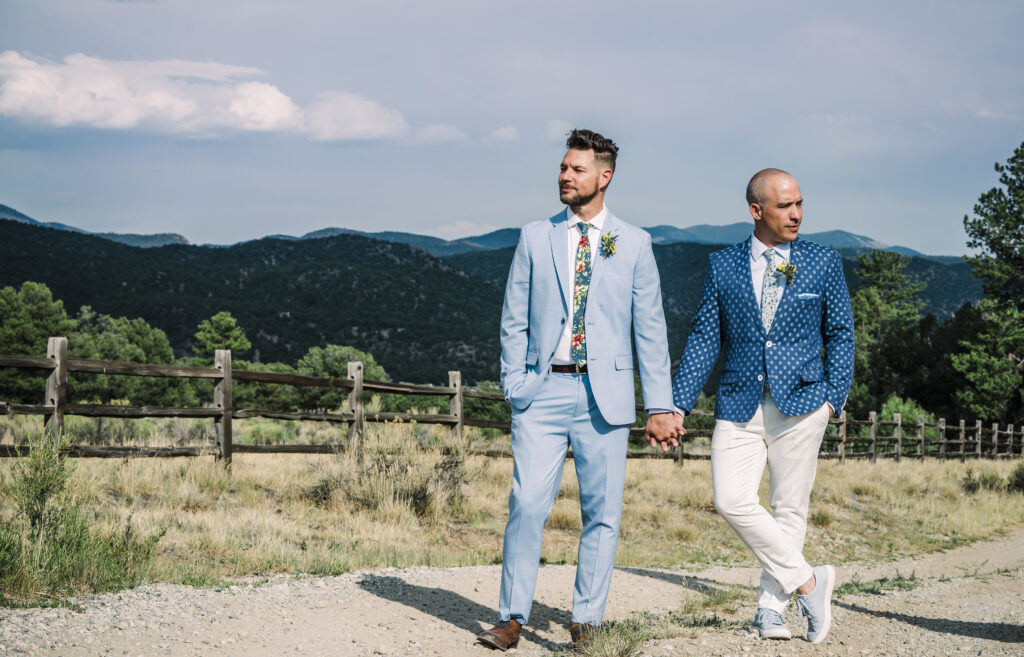Money with My Honey: How to Manage Finances as a Couple
Overview
In this podcast episode I talk about money and relationships with one of my favorite couples, John and David Auten Schneider. My wife and I have had the pleasure of becoming friends with them after getting to know them through their content at the Debt Free Guys website and the Queer Money podcast.
John and David help LGBTQ people and their allies live fabulously, not fabulously broke. Today’s podcast centers around the topic of “Money with your Honey” as relationships and finances are undoubtedly intertwined. We discuss how couples can effectively manage their finances while strengthening their bond.
In this 45 minute episode, John and David answer the following questions and more. If you’re short on time, these key points in Q&A below are broken out from the content of the video:
Key Points
- David and John’s Financial Journey
- What Are Some Money Mistakes That Couples Make?
- What are some ways to share expenses, especially when there is a disparity in income?
- How can you use guardrails to have a no-budget budgets?
- How do you recommend when your partner doesn’t want to talk about money?
- How can pre and post-nuptials be helpful?
Excerpt from the Podcast:
Jenni: All right. Welcome to the Modern Family Finance Podcast.
John: Hi there, Jenny. How are you?
Jenni: Good. So you guys are both happily married now for how many years?
 David: It was so funny. I was just thinking about this literally before we got on this call. We’ve been together for 20 years in January. We were officially married in 2017.
David: It was so funny. I was just thinking about this literally before we got on this call. We’ve been together for 20 years in January. We were officially married in 2017.
Jenni: Wow, 20 years.
John: We would have gotten married after a year and a half after we got together had that been an option.
Jenni: So you guys are like lesbians.
John: We’re like lesbians. Yeah, we did it fast. We just knew.
David and John’s Financial Journey (1:58)
Jenni: Awesome. And now you guys are helping others to “live fabulously and not fabulously broke“ as you say. Can you share a little bit about your financial journey together?
John: So about a year and a half after David and I got together, we were in the mountains of Colorado and we were having a weekend vacation there to visit a friend of mine. And while we were up there, we were thinking to ourselves, “this would be a great place to buy land and build a house.”
So we went to the realtor’s office that weekend before we left town, looked at some land and we’re having this amazing conversation. Then we start to have the discussion around what can we afford.
And then we realized that we were financially living in a hole. And we confessed to each other at that moment that we had $51,000 in credit card between debt between the two of us. And the irony was at the time we had about 15 years of combined tenure in financial services. So here we were literally helping other people invest, save for retirement, pay off debt, and build emergency savings. But we weren’t applying it to our own lives.
That was sort of our rock bottom moment when we realized that we were a cliché. We had all the designer clothing, we were going on vacations, and we were at all the happy hours and galas that the community was putting on. On the exterior things looked amazing. But we were a gay cliché of being fabulously broke. That is what got us on our journey of paying off our debt and then eventually we became the Debt Free Guys and Queer Money Podcast host.
David: After we paid off our debt was right when the financial crisis hit in 2008. We looked around and saw lots of people both in the national media and also within our own community who were living exactly the way that we had been living.
 People were using their homes as the ATM so they could take vacation and do all the things that they thought that they needed to in life. That’s when we thought there are some people we could help with this. So we decided to write a book because and we imagined Oprah inviting us on her show and doing the “you get a book, and you get a book, and you get a book.”
People were using their homes as the ATM so they could take vacation and do all the things that they thought that they needed to in life. That’s when we thought there are some people we could help with this. So we decided to write a book because and we imagined Oprah inviting us on her show and doing the “you get a book, and you get a book, and you get a book.”
We were fortunate that when we were shopping around our book there was an agent who recommended that we try to build an audience through a platform such as a blog, podcast, tv show, or a radio show. So that’s when we started Debt Free Guys. We are now in our ninth year of recording the Queer Money Podcast now.
It’s been quite a fun journey to be working together and enjoying our lives together while trying to help change the direction of our community financially.
Jenni: That’s awesome. You guys were definitely an inspiration that Lisa and I could build this business together. We thought if they’ve survived for nine years as a couple working together, so can we.
John: Yes. One of the most reoccurring questions that we get is “how can you work with your spouse?”
Jenni: It’s either gonna be amazing or it’s gonna totally explode. So you gotta figure out it out quick.
What Are Some Money Mistakes That Couples Make? (7:52)
Jenni: I often get couples coming to me because they are early on in their relationship and they’re thinking about getting married. They want to make sure their finances are set up. What are some money mistakes that you see couples make?
John: I think number the biggest mistake that we see couples make is that they don’t have discussions about money. Very often both partners don’t want to bring up the topic. They feel like it’s either rude to talk about money or they’re afraid to share their side of their money story with their partner.
Every time that we’re on other people’s shows and in media they always ask us “what’s one piece of advice you have for the community?” We always go back to simply starting to have that first conversation. Straight people aren’t doing a great job of it themselves, but the LGBTQ plus community is really not doing a good job of it.

David: The term “financial infidelity” is often used when you’re not being truthful with the person that you need to be the most truthful with. There was a survey done by a Finance App HoneyFi that found that couples who talk to each other about money were 83% more likely to say they had a good sex life. If you trust the person you’re with to share with them everything such as your financial habits, where you’re doing well, and what regrets you have, then you are increasing trust. And the more you trust somebody, the more you can be intimate with them.
So I always say, figure out a way to reveal. You don’t need to be an open book. But figure out a way to start peeling back the layers so that you can have those honest conversations with your partner.
Jenni: Are there particular topics that couples should make sure that they do discuss, especially if they’re thinking about getting legally married?
John: Yeah, we often recommend to our listeners and viewers who are just starting the money conversation to focus on the positive stuff first, such as, “What do you want your marriage to look like? Where do you want to live? What kind of things do you want to accomplish? Do you want to have children? What kind of house do you want to have? What does retirement look like to you?”
You are going to have some differences. But where you overlap think to yourself…What are we going to have to do to get there? What kind of income incomes are we going to need? How much money will we have to save? Then at that point think about what are the obstacles that would prevent us from getting there.
This is kind of conversation that can happen over time. You don’t have to do this all in one sitting. When you start to have the conversation of what obstacles are gonna keep us from getting there, that’s when you can start to disclose the information that might be a little bit sensitive such as debt, loans, or poor credit. Then you can start to say what do we have to do to overcome those obstacles to achieve our big life goals.
Jenni: That’s a really good idea.
What are some ways to share expenses, especially when there is a disparity in income? (14:13)
Jenni: So another challenge that I see when I talk to couples is when there’s a pretty large disparity in income. Lots of feelings on both sides. The lesser-earning partner may feel inferior or that they’ve got to work harder. The higher earner may feel that they have to foot the bill or that their financial ambitions are somewhat limited. How do you recommend couples manage a situation like that?
 David: In the LGBT community, it is very common for there to be disparity in income and disparity in age. And oftentimes, disparity in age comes with disparity of income.
David: In the LGBT community, it is very common for there to be disparity in income and disparity in age. And oftentimes, disparity in age comes with disparity of income.
I think we need to really be having more conversations around how do we work together as a couple, as a team, as a partnership, because that’s what we really want in life, right? When we’re looking for a mate, we really want somebody who has our back and we have theirs. It doesn’t matter that you have disparate incomes or disparate ages. As long as you are a couple that has trust in each other, then all of those things can be easily dealt with as long as you’re honest with each other.
As LGBTQ+ couples, our mom and dad’s model of dividing and managing money does not necessarily fit with us. We have different kinds of relationships and lifestyles. We know that “the man” is not necessarily going to be earning all the money and be responsible for all the finances. We have to figure out what works for us.
I would go back to the beginning and focus the conversation on what your big goals are first and then reverse engineer to that. In that discussion, you can figure out what makes sense in terms of dividing the finances. This isn’t just something that you say in one conversation before you get married, but in conversations to have over a lifetime.
Jenni: What are some ways that couples can manage their expenses together? Can you give some examples of how you’ve seen other people managing expenses under one household, when they don’t want to just throw everything into one pot like my mom and dad did?
David: There are really basically three ways to break it down:
1) The first one is the 50/50 split. If your incomes are close to being the same, then you may have one pot, or you may have two accounts but you both are paying 50/50 on the shared expenses.
2) The second option is the percentage split. That is oftentimes the way that people who have large differences in income split the finances. If you’re making 50% percent more than your partner, then you’re probably going to pay 50% percent more of the bills.
3) The last one is that you come to some sort of agreement splitting the bills. You can divide it based on the kinds of things that you each want to pay for. One of the nice things about that doing that kind of split is then you each pay for things that you really want in life. So if you’re with a partner that absolutely loves travel, then they can pay for that. This allows you to each use the money you’ve earned to contribute to the life that you want rather than feeling like your partner is holding you back.
Jenni: I’m curious to get your process for how you guys manage your budget. Are you tracking everything?
John: Yeah, there are a million budgets out there, and we used to track everything when we were paying off our debt. We were managing our budget down to the penny because we wanted to pay off our debt as quickly as possible.
When we paid off our debt, we eased up on the restrictiveness a little bit. And eventually over time, we just have our guardrails and we do what’s called the “no budget, budget”, which is just kind of, we know how much we want, we’re allowed to sort of spend in certain areas and we just kind of stay cognitively stay within those guidelines, but we’re not looking at the budget every single day like we used to, but that’s all contingent on where you’re at in your life and what your financial goals are.
So if you need to have that more restrictive budget you can find an app or use Excel spreadsheets. But if you want to do something a little bit more I guess casual or at ease, then go with a “no-budget budget” idea.
How can you use guardrails to have a no-budget budgets? (33:40)
Jenni: How do you guys use guardrails?
David: For us, it’s a monthly allotment. We do pop for that $150 dinner with a nice bottle of wine and really enjoy ourselves. But we know that’s not something that we can do several times a week. That’s something that we can do once or twice a month.
 We have gotten into a habit of really understanding what we do on a regular basis with our money. We know that we usually spend about $150 to $200 a week on groceries. When we were acquiring our debt we would spend $400 a week on groceries and $400 a week dining out.
We have gotten into a habit of really understanding what we do on a regular basis with our money. We know that we usually spend about $150 to $200 a week on groceries. When we were acquiring our debt we would spend $400 a week on groceries and $400 a week dining out.
John: It’s really critical to know what are your priorities. That’s why it’s important to have the discussion of what is it you want your life to look like and what really matters most to you. Because part of what got us into so much debt was that we just thought we had to have and do everything. If we missed an event, if we weren’t seen, we felt like we weren’t worthy. When you align, your spending with your values, that’s when you can find the financial freedom.
So one of the questions we used to often ask ourselves in Denver was, “Do you want to have a margarita here in Denver? Or would you rather have the margarita in Puerto Vallarta?” Invariably the answer was always Puerto Vallarta, right? That’s where knowing your values helps you consciously manage your budget without having to look at a spreadsheet or app every single day.
How do you recommend when your partner doesn’t want to talk about money? (40:04)
Jenni: What happens if the other person doesn’t want to talk about money? They’ve shut down the conversation about money or they don’t want to be involved?
John: Yeah, I think that’s a great opportunity to find a third party to act as an intermediary for you. Oftentimes the partner is putting up a wall because they think the other person is judging them or controlling them or will judge them or will try to control them.
A moderator can come in and act as the go-between to get a conversation going in a pragmatic and judicious way. They can get both parties to open up about what their money story.
You see this in other topics too, right? There are numerous topics for whatever reason that couples just can’t talk amicably about. That’s where a financial planner, a money therapist, or a friend who is really good with money can act as an intermediary.
How can pre and post-nuptials be helpful? (41:46)
Jenni: Great. Last question, let’s talk about pre and post-nuptials. What are they and when are they helpful?
David: Pre and post-nuptials are an agreement that you have with your partner that is made either before or after you get married.
 One of the things a lot of people don’t understand is that you can actually have a post-nuptial. Legally, it’s kind of the same thing. After you get married, you work with an attorney that draws up this agreement of what happens with your money in certain circumstances. This could be if there is a divorce, if you have children, or especially in this day and age if you bring another partner into the relationship. This outlines how you will interact with each other when it comes to your financial situation.
One of the things a lot of people don’t understand is that you can actually have a post-nuptial. Legally, it’s kind of the same thing. After you get married, you work with an attorney that draws up this agreement of what happens with your money in certain circumstances. This could be if there is a divorce, if you have children, or especially in this day and age if you bring another partner into the relationship. This outlines how you will interact with each other when it comes to your financial situation.
The nice thing about doing that is you do work with a professional that is trained in asking really good questions about what it is that you want your financial life to look like.
There’s a lot of negativity around this because people assume a postnup or a prenuptial is a death sentence to marriage or will lead to divorce. But it’s no different than life insurance. It is literally life insurance for your finances if your relationship changes. Not everybody needs or wants them, but some people do need and want them and there shouldn’t be any judgment around why.
Jenni: Thanks for all this advice. How can folks listening find you and your content?
John: You can find us at DebtFreeGuys.com and on the Queer Money Podcast which you can access on almost any podcast player.
Jenni: Awesome. Thank you.
